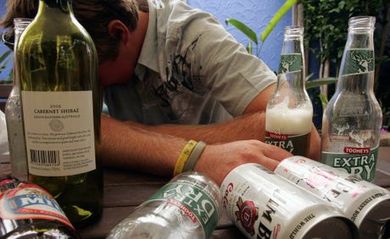 Do you ever drink to the point of drunkenness, either intentionally or unintentionally? Is it a rare occasion, or something you do frequently? Are you concerned about someone you know who engages in binge drinking? Some of my clients report patterns of alcohol abuse that are clearly significant, but which don’t fit the pattern of a daily struggle with alcohol. One example is intermittent binge drinking. This lead me to research the question, is binge drinking a marker of alcoholism? Binge drinking is common in the U.S. – and not just among high school and college aged people. According to the CDC , 70% of alcohol bingeing episodes in the U.S. involve adults aged 26 and older[1]. You may be surprised to hear that only 10% of heavy/ binge drinkers also met the criteria for alcohol dependence in a 2014 report by the National Survey on Drug Use and Health[2]. So while many alcoholics binge drink, not all binge drinkers are alcoholics.
What defines binge drinking? How does it differ from alcoholism? Before we go on, let’s define some terms. The NIAAA calls binge drinking a pattern of drinking that brings blood alcohol concentration (BAC) levels to 0.08 g/dL, typically occurring after 4 drinks for women and 5 drinks for men in about 2 hours[3]. The Substance Abuse and Mental Health Services Administration (SAMHSA) defines it as drinking 5 or more drinks on the same occasion at least once in the past month[4]. The definition of alcoholism, or alcohol dependence, has shifted in the latest edition of the DSM (the Diagnostic and Statistical Manual – the text for diagnosing mental illness in the U.S.). The DSM-4 had separate criteria for alcohol abuse and alcohol dependence; the DSM-5 brings the two together under the term "Alcohol Use Disorder (AUD)". AUD recognizes that it's more useful to talk about substance use behavior in terms of a continuum with many shades of grey between individuals who do not use substances at all, and those whose lives and health are profoundly damaged by substance use. Binge drinking constitutes excessive drinking behavior, but the extent to which it signals physiological dependency must be determined on a case-by-case basis. And of course, some of the greatest dangers of binge drinking, such as drunk driving accidents and alcohol poisoning, pose a threat to the drinker whether or not (s)he has a physical dependence on alcohol. Take stock of your habits If you are an occasional or frequent binge drinker, it’s important self care to honestly examine your drinking habits and assess how your drinking affects your life. Click the link above and read the DSM's description of Alcohol Use Disorder, and notice how many criteria you meet. Explore what kinds of risks you may be exposing yourself to when you binge drink. Consider your binge drinking in the context of all of your alcohol-related behaviors. How much of a role does alcohol play in your life? What are the benefits and drawbacks? How much control do you feel you have over your alcohol consumption? If you’re on the higher end of the alcohol use spectrum, would it be hard for you to shift into more moderate drinking patterns? What would that entail for you? What would be some of the benefits? Portrait of a moderate drinker Most researchers agree that a moderate drinker is one who consumes approximately:
Getting support A psychotherapist can help you explore the role your binge drinking and alcohol in general plays in your life, so you can make good decisions about how to best take care of yourself. You may or may not ultimately need to consider sobriety your only option for controlling your substance use. See this blogpost for more information about what to do if you want to work on moderating your alcohol use before committing to sobriety. REFERENCES [1] Naimi TS, Brewer RD, Mokdad A, Clark D, Serdula MK, Marks JS. Binge drinking among US adults. JAMA 2003;289(1):70–75. [2] http://www.cdc.gov/pcd/issues/2014/14_0329.htm [3] National Institute on Alcohol Abuse and Alcoholism (NIAAA). NIAAA Council Approves Definition of Binge Drinking. NIAAA Newsletter, Number 3, Winter 2004. Available at: http://pubs.niaaa.nih.gov/publications/Newsletter/winter2004/Newsletter_Number3.pdf [4] Substance Abuse and Mental Health Services Administration (SAMHSA). Binge Drinking: Terminology and Patterns of Use. Available at: http://captus.samhsa.gov/access-resources/binge-drinking-terminology-and-patterns-us Comments are closed.
|
Blog Categories
All
Archives
September 2022
AuthorMaysie Tift is a licensed Marriage and Family Therapist and a Certified Master Hypnotist with offices in San Rafael, CA and San Francisco, CA. |
 RSS Feed
RSS Feed